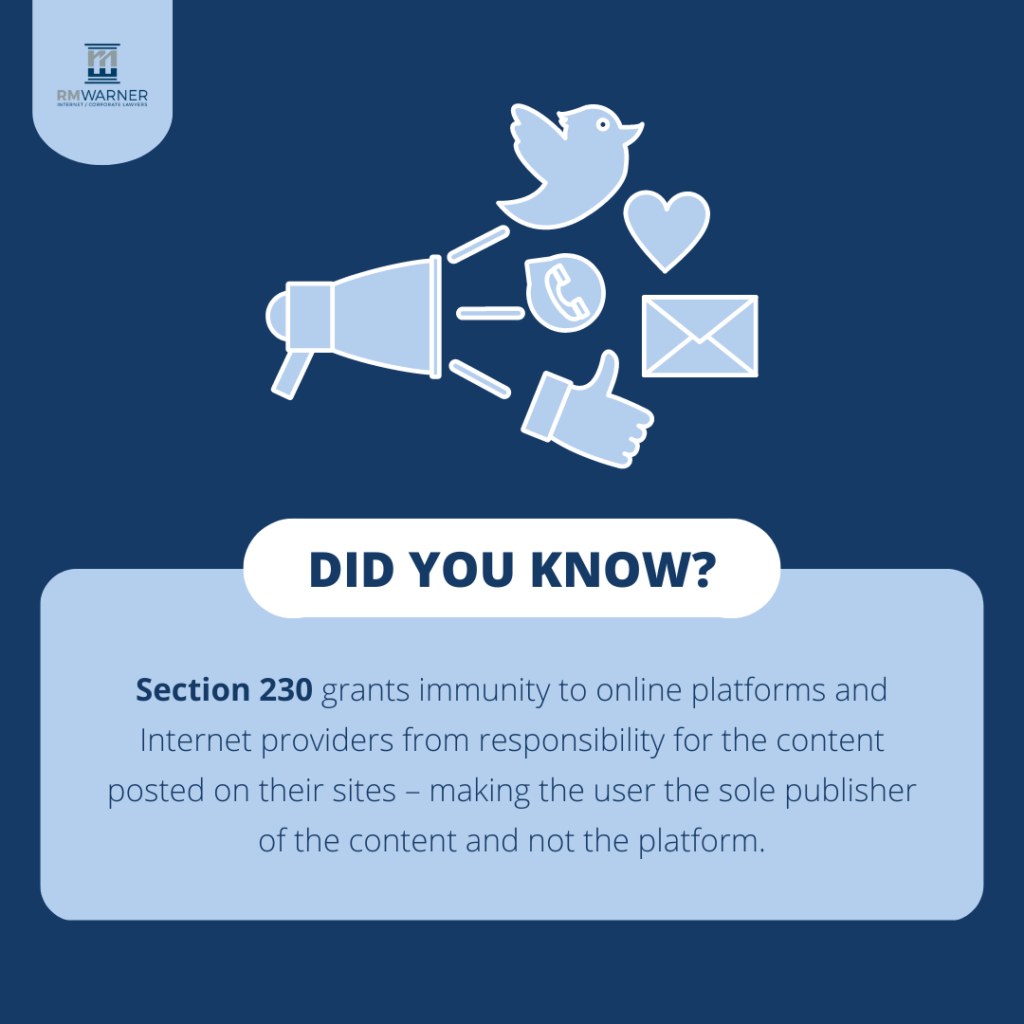 On Wednesday September 23rd, 2020, The Department of Justice sent draft legislation to Congress to reform Section 230 of the Communications Decency Act. Among the items they are attempting to reform is a “Case-Specific Carve-Out” that would require platforms to take content down that is unlawful – including content deemed as defamation in court.
On Wednesday September 23rd, 2020, The Department of Justice sent draft legislation to Congress to reform Section 230 of the Communications Decency Act. Among the items they are attempting to reform is a “Case-Specific Carve-Out” that would require platforms to take content down that is unlawful – including content deemed as defamation in court.
In the past, Section 230 has granted immunity to online platforms and Internet providers from responsibility for the content posted on their sites – making the user the sole publisher of the content and not the platform. However, as the Internet has grown and flourished since Section 230 was established in 1996, the Department of Justice has noticed room for improvement within the broadly worded law.
The “Case-Specific Carve-Out” of Section 230
We can go into further detail on all of the proposed areas of reform, but as defamation attorneys, the “Case-Specific Carve-Out” is the change we find to be the most exciting.
“I’ve been saying this for years; there should be a carve out for court orders and injunctions,” says Daniel Warner, defamation attorney at RM Warner Law. Mr. Warner explains that “It makes no sense to have a carve-out for intellectual property issues, which include copyright claims and DMCA notices, but not court orders or judgments that declare specific content to be defamatory or otherwise unprotected speech. It’s ridiculous that DMCA takedown notices, which any person can submit, would get a site to takedown entire web pages before a court order or judgment. This sends a message that copyrights are more important than a person’s reputation, but for most people — particularly small business owners (the backbone of America) — their reputation is their livelihood.” Mr. Warner states that, “I’ve seen too many defamation victims who are finally able to get some small amount of justice once they get a court order, to only become victimized again by this terrible law when they discover that a website or search engine refuses to take down content that has been declared unlawful by a judge.”
How Section 230 Revisions Help Defamation Victims
It has always been a frustration for victims of defamation – who have won their trial in court – but are unable to have the damaging content removed from the Internet. Imagine spending time and money winning your case in court only to still have the defamatory content follow you for the rest of your life. A simple google search of your name or your name of business associated with defamatory content can cost you your business, job offers, relationships, and more.
For years, Internet platforms like Google and Facebook have been able to hide behind the protections of Section 230 that grant them immunity from responsibility. Hopefully this new legislation will finally help defamation victims who have continued to be harmed each and every day by the unlawful content that has remained online.
Unfortunately, the vast majority of websites who refuse to voluntarily remove unlawful and defamatory content do so because they make money off the traffic that the illegal content generates. There is no reason why bad people should be allowed to profit from keeping illegal and life-destroying content online. The law should not be encouraging people to capitalize on the unlawful destruction on someone’s hard-earned reputation. As a society, we must be better than this.
In Need of a Defamation Lawyer?
If you need legal counsel to help remove defamatory content online, get in contact with one of our experienced defamation attorneys. It’s our reputation to restore yours.





8 Comments
Leave your reply.